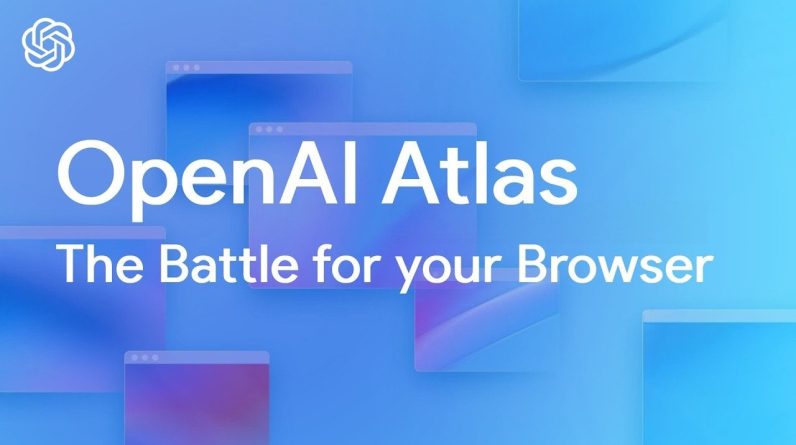
What if your browser didn’t just help you search, but actively worked alongside you, summarizing articles, drafting emails, or even automating repetitive tasks? Enter ChatGPT Atlas, OpenAI’s ambitious leap into the browser market. Built on Google’s Chromium platform, this AI-powered browser promises to redefine how we interact with the web. But in a space dominated by giants like Google Chrome and emerging competitors like Perplexity’s Comet, the stakes couldn’t be higher. With its bold vision of embedding artificial intelligence directly into the browsing experience, Atlas doesn’t just aim to compete, it’s here to challenge the very idea of what a browser should be. The question is: will it succeed in reshaping the digital landscape, or is it a futuristic idea ahead of its time?
In this overview of ChatGPT Atlas by Sam Witteveen, you’ll discover how it stands apart in a crowded market, from its contextual AI tools to its emphasis on privacy-first features. We’ll unpack its innovative capabilities, like Agent Mode and Browser Memory, which promise to make your online experience more intuitive and efficient. But it’s not all smooth sailing, Atlas faces hurdles like limited platform availability and compatibility issues that could slow its adoption. Whether you’re a tech enthusiast curious about the future of AI or a casual user wondering if it’s worth switching from your trusty browser, this perspective will shed light on the opportunities and challenges shaping Atlas’s journey. After all, the battle for your browser isn’t just about technology, it’s about how we navigate and shape the web itself.
ChatGPT Atlas AI Browser Overview
TL;DR Key Takeaways :
- ChatGPT Atlas is a new AI-integrated browser by OpenAI, built on Google’s Chromium platform, aiming to redefine web browsing with features like contextual assistance and task automation.
- Key features include “Ask ChatGPT” for real-time insights, “Browser Memory” for personalized reminders, “Agent Mode” for local automation, and “Cursor Chat” for inline AI interactions.
- Privacy and security are prioritized, with options for anonymous usage and local data processing to minimize external data exposure.
- Current challenges include limited platform availability (MacOS only), inconsistent feature performance, and compatibility issues with certain websites blocking OpenAI services.
- Atlas faces stiff competition from established browsers and emerging AI-powered tools, requiring consistent updates, broader compatibility, and user-focused improvements to succeed in the market.
What Sets ChatGPT Atlas Apart?
ChatGPT Atlas represents OpenAI’s vision to redefine the browsing experience by integrating AI into the core functionality of a web browser. Unlike traditional browsers, Atlas emphasizes productivity and contextual assistance, aiming to anticipate your needs and streamline tasks. This approach aligns with the broader industry shift toward AI-enhanced browsing, often referred to as the “answer engine” era.
The browser’s primary goal is to provide a seamless, intelligent experience that goes beyond simply retrieving information. By embedding AI directly into the browsing process, OpenAI aims to create a tool that not only searches but also interprets, summarizes, and assists with tasks in real time. This focus on proactive assistance and contextual understanding sets Atlas apart from conventional browsers.
Innovative Features of ChatGPT Atlas
ChatGPT Atlas introduces a range of features designed to enhance your browsing experience and improve efficiency. These include:
- Ask ChatGPT: A side panel that allows you to interact with AI directly. This feature provides contextual insights based on the page you are viewing, allowing you to request summaries, explanations, or assistance with tasks such as drafting emails or analyzing content.
- Browser Memory: A tool that tracks your activity to offer personalized reminders and insights. By learning your habits, this feature aims to make your browsing experience more intuitive and tailored to your preferences.
- Agent Mode: A local automation tool that performs tasks and searches on your behalf. Operating directly on your device, this mode enhances productivity while maintaining your privacy.
- Cursor Chat: Inline AI interactions that allow you to generate text directly within the browser. Whether drafting responses, creating content, or completing forms, this feature enables you to stay focused on your tasks without switching between applications.
These features are designed to save time, reduce effort, and make browsing more interactive. By integrating AI into everyday tasks, Atlas aims to redefine how you engage with the web.
New OpenAI ChatGPT Atlas AI Browser Guide
Dive deeper into ChatGPT Atlas with other articles and guides we have written below.
Privacy and Security: A Foundational Pillar
Privacy is a central focus for ChatGPT Atlas. OpenAI has implemented measures to give you control over how your data is accessed and used. You can choose to run agent-driven tasks either while logged in or anonymously, making sure that your browsing habits remain private and secure.
Additionally, the Agent Mode operates locally on your device, reducing the need to send data to external servers. This approach enhances security and sets Atlas apart from competitors, particularly in an era where data privacy is a growing concern. By prioritizing user control and minimizing data exposure, OpenAI addresses one of the most significant challenges facing AI-powered tools today.
Performance and Current Challenges
As with any emerging technology, ChatGPT Atlas faces several challenges. Early users have reported mixed results, with some features performing inconsistently. For example, the AI’s ability to provide contextual insights can vary depending on the complexity of the task or the content of the website being accessed.
Platform availability is another limitation. Currently, Atlas is only available for MacOS users, with plans to expand to Windows and mobile platforms in the future. This restricted access may slow adoption, particularly among users who rely on other operating systems.
Compatibility issues also present a challenge. Certain websites actively block OpenAI services, which can limit the browser’s effectiveness in specific scenarios. These hurdles highlight the need for ongoing updates and refinements to ensure a smooth and reliable user experience.
Impact on the Browser Market
The launch of ChatGPT Atlas marks a significant shift in the tech industry toward AI-integrated browsing. This trend challenges the dominance of traditional search engines and browsers, which have long been the primary tools for navigating the web.
Competitors like Google are likely to respond by incorporating similar AI features into their platforms, intensifying the competition. For Atlas to succeed, it must not only innovate but also address user concerns around performance, compatibility, and privacy. Its ability to consistently deliver a high-quality experience will be critical in determining its position in the market.
Adoption Challenges and Future Prospects
Despite its potential, ChatGPT Atlas faces significant barriers to adoption. Many users may hesitate to switch from established browsers like Chrome, especially if Atlas does not offer a clear advantage in terms of performance or unique features. Early-stage limitations, such as inconsistent functionality and restricted platform availability, could further deter potential users.
To overcome these challenges, OpenAI will need to focus on regular updates, feature enhancements, and broader compatibility. By addressing these concerns, Atlas could position itself as a compelling alternative to traditional browsers. Its success will depend on its ability to adapt to user needs and compete effectively in an increasingly crowded market.
ChatGPT Atlas represents a bold step forward in the evolution of web browsing. By integrating AI into the core of the browsing experience, it offers a glimpse into the future of how we interact with the web. While challenges remain, its innovative features and focus on privacy provide a strong foundation for growth and adoption. Whether it can emerge as a leader in this space will depend on its ability to deliver consistent performance, address user concerns, and stay ahead of the competition.
Media Credit: Sam Witteveen
Filed Under: AI, Technology News, Top News
Latest Geeky Gadgets Deals
If you buy something through one of these links, Geeky Gadgets may earn an affiliate commission. Learn about our Disclosure Policy.
Originally Appeared Here








